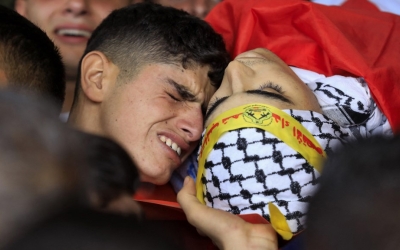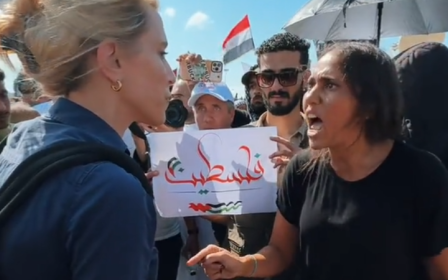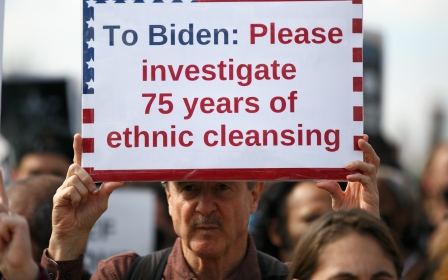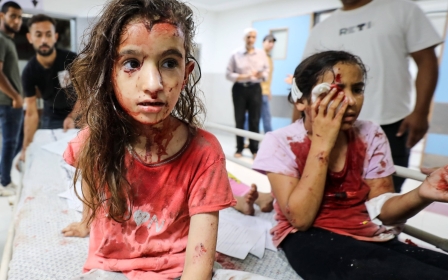Israel-Palestine war: Will the West choose genocide or peace?
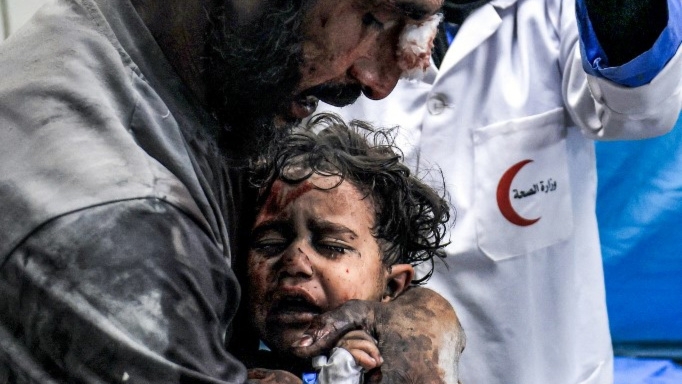
Twenty days into Israel’s bombardment of Gaza, thousands of people have been killed, with the death toll climbing each hour - and still, the West remains silent.
Over the course of my career, I have covered Israel’s repeated massacres in Gaza, its violent occupation of the West Bank, and the introduction of racist laws targeting Palestinian citizens of Israel.
But I have never witnessed a war like this. Despite the fear, trauma and shock of the 7 October Hamas attack, Israel has crossed many red lines in its disproportionate response.
The country has entered a genocidal state of mind - and it will be hard to go back.
In a recent interview with Al Jazeera, former Knesset member Moshe Feiglin said the only solution is the “complete destruction of Gaza … destruction like in Dresden and Hiroshima, without a nuclear weapon”.
Defence Minister Yoav Gallant has likened Palestinians to “human animals”, imposing collective punishment on millions of civilians, and vowed to “wipe this thing called Hamas, ISIS-Gaza, off the face of the earth”. He has made these threats to a population of 2.3 million people in Gaza who have been under a crippling siege for 16 years, with the UN warning the territory would already be considered uninhabitable by 2020.
Researcher Eliyahu Yossian, who has been dubbed “the new star of this war”, has made some of the most savage comments, asserting: “You have to enter Gaza at the height of brutality, with the aim of revenge, zero morality, maximum corpses.”
It is a call to finish off Gaza - to leave no one alive.
Ongoing massacres
The West has challenged none of this. Instead, western leaders maintain that Israel has a “right to defend itself”, while ensuring a continuous flow of weapons. Palestinian children are watching an endless live stream of blood and bodies, under a blanket of western silence. What will come of this?
In the US, President Joe Biden has promised: “We are going to keep Iron Dome fully supplied so it can continue standing sentinel over Israeli skies, saving Israeli lives.” When it comes to Palestinian lives, he has merely questioned the veracity of the health ministry’s death toll - prompting the ministry to publish a list of every victim’s name.
Follow Middle East Eye's live coverage for the latest on the Israel-Palestine war
In the UK, Prime Minister Rishi Sunak has expressed his nation’s “unequivocal” support for Israel and ordered Britain to abstain from voting on a UN resolution calling for “humanitarian pauses” in Gaza. Labour leader Keir Starmer has backed Israel’s vicious retaliation and told MPs to stay away from pro-Palestine rallies.
In France, President Emmanuel Macron has gone so far as to suggest that the international coalition formed to fight the Islamic State should be broadened to also target Hamas.
The message from the world is this: if you are Palestinian and you get killed, it doesn't matter, because you have no value
These are just a few among many examples. The West could have played a different role in this crisis; instead, it has largely chosen to be complicit in Israel’s massacres in Gaza.
As Middle East Eye’s Palestine/Israel bureau chief, I am responsible for reporters in Gaza. We have lost communication with them numerous times throughout this war.
When they resurface after several days, the first question they inevitably ask is whether the world is doing anything to help.
They are looking for a statement, for a little piece of hope. I am never able to provide one.
Double standards
I used to believe in the West as a part of the world that valued human rights, unlike countries such as China and Russia. I was wrong. This war has shown the true face of the West: pure racism.
In the western perspective, solidarity is selective; if you are white and you get killed, it is unacceptable. The outpouring of grief and rage over the Ukrainian victims of Russia’s onslaught, compared with the shameful silence over successive waves of Palestinian victims, highlights this distressing double standard.
For context, more than 9,000 civilians have been killed in Ukraine since the February 2022 war broke out, while in Gaza, more than 8,000 people - the vast majority civilians - have been killed in just three weeks.
The message from the world is this: if you are Palestinian and you get killed, it doesn’t matter, because you have no value. Your value is determined by whether your name is Fatima or Michelle.
How can the West express shock over the terrorism that unfolded in Israel’s south, while in the same breath encouraging Israel to continue killing Palestinians in Gaza? Killing cannot be justified as a response to killing.
Generations to come will no longer rely on the West to deliver justice for them. Western countries have turned their backs on the Gaza prison camp for more than 16 years. But without a just political solution, this conflict will not disappear.
Killing thousands of young children will not create peace for Israel. The choice today is stark. It’s either genocide, ethnic cleansing and another Nakba, or a genuine political process that takes into account the legitimate demands and aspirations of the Palestinian people.
The views expressed in this article belong to the author and do not necessarily reflect the editorial policy of Middle East Eye.
Middle East Eye propose une couverture et une analyse indépendantes et incomparables du Moyen-Orient, de l’Afrique du Nord et d’autres régions du monde. Pour en savoir plus sur la reprise de ce contenu et les frais qui s’appliquent, veuillez remplir ce formulaire [en anglais]. Pour en savoir plus sur MEE, cliquez ici [en anglais].



